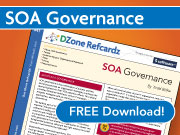 Will your culture allow an impact player?
Will your culture allow an impact player?
Jordan Haberfield of Excel Partner recently posted a blog titled “Enterprise Architects as ‘Impact Players'”. I’ve enjoyed Jordan’s blog as it discusses EA from a different perspective, one of talent and corporate culture, rather than the technical aspects. I’ve always found the human and social aspects of things very interesting.
Anyway, he provides an excerpt from a book he read called “Don’t Send a Resume: And Other Contrarian Rules To Help Land A Great Job” by Jeffery Fox which introduces the role of the impact player. Here’s the quote:
“There is always a job in a good organization for an impact player. An impact player is someone who can quickly improve the economics of a company. An impact player is someone who can bring in customers, energize the sales force, restructure an under-performing department, speed up the innovation process, solve the late shipment problem, or physically move the manufacturing facility to a lower cost area. An impact player also is someone who will do the necessary but noxious tasks no one else wants to do. An impact player is someone who will get their hands dirty, pick up a shovel and start shoveling, open the store early and close late, deliver product on their way home, deal tirelessly with irate customers and make a service call on Christmas Eve. Good executives in good companies want to hire impact players.”
Jordan goes on to state that “Enterprise Architects are in a position to become that impact player and make a significant difference.” It’s probably better stated that Enterprise Architects should be in a position to do this. Whether they are or not is highly dependent on the corporate culture.
I’ve spoken with a number of colleagues in the St. Louis area, and it’s my understanding that many of the organizations here where I reside don’t even have a formal EA group. Why is this important? It’s important because I believe that an impact player often has to transcend boundaries and operate outside of the constraints that a particular job description may imply. If an organization doesn’t have an Enterprise Architecture discipline, someone needs to go outside of the box of their current job description and start doing EA. If the corporate culture is resistant to people operating outside of their formal job description, that impact player is going to need some very thick skin.
A great example is from two years ago when Jason and Ron at ZapThink emphasized the need for the SOA Champion to guide an organization through SOA adoption. SOA is not about buying an ESB, Registry/Repository, or any other tool. For the bulk of companies that comprise the “status quo” of Service Averse Architecture, it’s about a fundamental change to the way IT solutions are delivered which can cover organizational change, process change, and technology change. What organization has a formal role established for this position? Probably not many. It requires someone to be an impact player, think outside the box, transcend boundaries, and pave the path for the new way of doing things.
Some companies encourage individuals to think outside of the box and outside of their formally stated responsibilities, and it’s probably one that should be added to the litmus test for a company likely to be successful with innovation and strategic initiatives. After all, the degree to which a company does this is a matter of trust. Unfortunately, it’s far easier to break down that trust that it is to build it up. For those of you dealing with that, follow this link to another excellent book that I’ve read.
In summary, the original quote by Dr. Fox states that “There is always a job in a good organization for an impact player.” The key part of this is “good organization.” If you are exhibiting the qualities of an impact player, but you’re struggling to be successful, take a look at the organization’s culture and see whether it is a “good organization” or not. If you’re looking for a good organization, you may need to look for the foot-in-the-door opportunity, because often times, it takes an outsider to come in and recognize the areas for potential impact, so you’re not going to find it on Monster or Dice.
